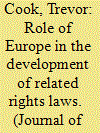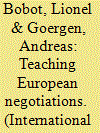| Srl | Item |
| 1 |
ID:
110493


|
|
|
|
|
| Publication |
2011.
|
| Summary/Abstract |
As a European intellectual property lawyer, the author is often struck by the amount of comparative analysis in the area of intellectual property which adopts US intellectual property laws, rather than European ones, as their point of comparison. This seems strange when in many respects US intellectual property laws have their own unique features and when European such laws are often more closely aligned with the laws of most other countries in the world. This series of articles aims to expand knowledge of and to explain something of European intellectual property laws; how they got to their present state, what are current hot topics in them, where they are heading and why they matter. This second article in the series will focus on related rights.
|
|
|
|
|
|
|
|
|
|
|
|
|
|
|
|
| 2 |
ID:
098448


|
|
|
|
|
| Publication |
2010.
|
| Summary/Abstract |
The European Union is probably the most complex political and institutional decision-making structure known to humankind. Nowadays, scholars increasingly agree that no single theory can explain all the mechanisms at work in the system of EU governance and decision-making at all levels in any satisfactory way. Even for trained experts and specialists, the complexity of the EU machinery is extremely difficult to grasp. The extensive academic debate in this area is an indicator for both the sophistication of the scholarly discussion and the uncertainty of those who are trying to understand and explain the European integration project. For students who are just learning about the field, trying to untangle that complexity is even more challenging. The difficult task for teachers and instructors is finding ways to introduce students to the institutional framework and the related legislative processes of EU decision-making, and thereby help to facilitate their understanding of the nature of the Union. The purpose of this study is to suggest an alternative teaching method. The simulation "EU Chocolate Directive," can provide participants with the tools necessary to negotiate more effectively at the EU level.
|
|
|
|
|
|
|
|
|
|
|
|
|
|
|
|